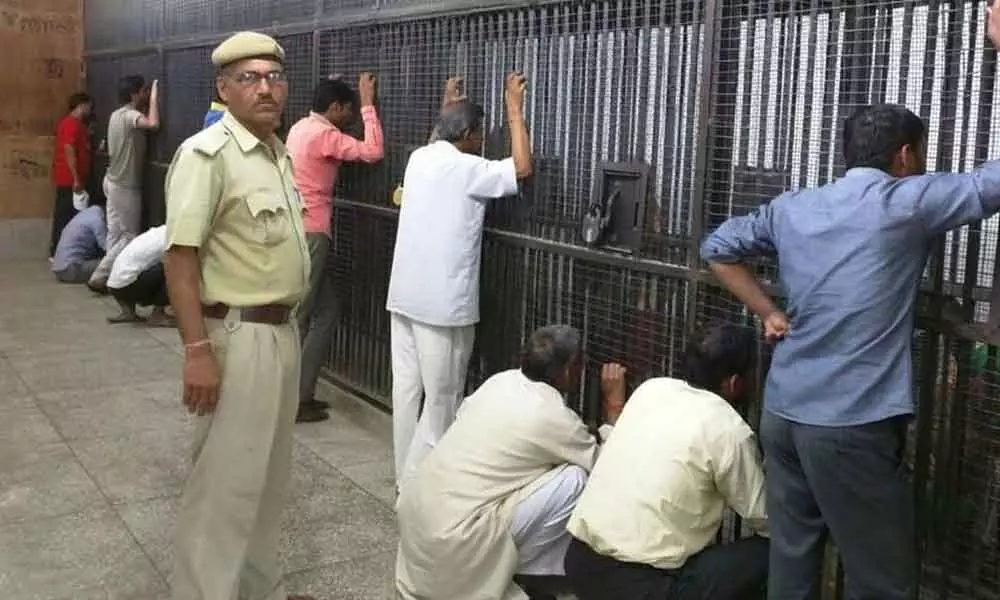Mass prison system: The surveillance state in India

The Ministry of Electronics and Information Technology (MeitY) issued guidelines to social media companies operative in India. This move to come up with new IT Rules is alarming as the Government will now have legal access to all the chats of Indian citizens.
The Ministry of Electronics and Information Technology (MeitY) issued guidelines to social media companies operative in India. This move to come up with new IT Rules is alarming as the Government will now have legal access to all the chats of Indian citizens. This is a blatant breach of the Right to Privacy. The right to privacy is a fundamental right under Article 21. The current Government has used every opportunity to arrest the democratic voices, including the arbitrary arrests of journalists, students, activists and professors. Now this move will effectively be used by the Indian illiberal, ethnic Government to pro-actively further their agenda.
Alongside, the Union Home Ministry is already underway to make changes to criminal law to make "hate speech" an offence punishable with up to two years in prison. These upcoming changes will add two sections to the IPC: 153C and 505A. These rules and upcoming amends come with a colourable justification: to maintain internal security. But citizens know how the state uses "security" as an excuse to detain democracy.
Foucault, a post-structuralist philosopher, is popularly known to have understood the power in different terms. In medieval times, power is vested with a king. Those violating the law of the land are immediately put to death in public. With ages passing, sovereign power is no more functional. It is disciplinary power. In the modern era, the state confines the "criminals" to prisons and correct them, discipline them. Disciplining is at the intersection of utility and subjection. State disciplines the prisoners so that when they join the society, they should be productive. But for that to realise, they have got to subject the prisoners to power and violence. A peek into the Indian prisons will expose you to a range of techniques employed to make these prisoners docile bodies via constant surveillance from Benthamite panopticon like prison structures and discipline through the subjection.
Writing in the 1970s, Foucault did not locate the disciplining power in certain institutions. He said that this power flows in capillaries. Taking on from there, the French philosopher, Deleuze, wrote about "society of control". In such a society, while freedoms may seem like expanding, the control extends too.
We have moved away from disciplining society to a society of control. Anyone can put their opinions on digital media, and anybody can file a complaint under the upcoming amendments to IPC.
Today, such arbitrary arrests are already underway. But, these new IT rules may make the citizens fear the consequences of speaking their opinion even with the people they trust. This will create gaps in the creation of democratic capacities and dry out the social capital. Social capital is significant for the development of a country. These new rules will only alienate people from each other. All this results from the fear that we are constantly watched. The target of these new rules could well be an investigative journalistic piece or a student's opinion of Kashmir under the banner of "hate speech". Varavara Rao in his book Captive Imaginations writes, "The jail is but a microcosm of this complex, turbulent and enslaved world." Never have what he told resonated very much in me than today- looking at the trajectory of the Government's will to reduce the citizenry into docile bodies, whose thoughts and emotions are subjected through constant surveillance. What is alarming this time is that while erstwhile laws for surveillance have been under a shadow, today's Government has in broad daylight said that "no fundamental rights are absolute". This open embracing of undemocratic ways of ruling a country brings India much closer to Trump's America once again. This genocide of democracy in India is not welcome. Transforming the world's largest democracy into a mass prison system under constant surveillance should be democratically challenged.
(The author is pursuing her Masters course at Centre for Political Studies, JNU, Delhi)








